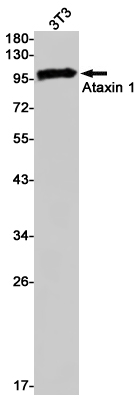Ataxin 1 Recombinant Rabbit mAb
Cat No.: ARM1499
 Size:
Size:

| Product Name: | Ataxin 1 Recombinant Rabbit mAb |
| Cat No.: | ARM1499 |
| source: | Rabbit |
| reactivity: | Human, Mouse, Rat |
| applications: | WB,IP |
| clonality: | Monoclonal |
| recommended dilution: | WB,IP |
| format: | Liquid |
| isotype: | IgG |
| immunogen: | Recombinant protein of human Ataxin 1 |
| calculated molecular weight: | 87 kDa |
| observed molecular weight: | 105 kDa |
| genbank accession number: | P54253 |
| gene id (ncbi): | 6310 |
| purification method: | Affinity Purification |
| conjugate: | Un-conjugated |
| storage: | Store at -20°C. Supplied in 50nM Tris-Glycine(pH 7.4), 0.15M NaCl, 40%Glycerol, 0.01% sodium azide and 0.05% BSA. Stable for 12 months from date of receipt. |
| synonyms: | ATX1; SCA1; D6S504E |
| category: | Primary Ab |
| concentration: | 1mg/ml |
| background: | The autosomal dominant cerebellar ataxias (ADCA) are a heterogeneous group of neurodegenerative disorders characterized by progressive degeneration of the cerebellum, brain stem and spinal cord. Clinically, ADCA has been divided into three groups: ADCA types I-III. ADCAI is genetically heterogeneous, with five genetic loci, designated spinocerebellar ataxia (SCA) 1, 2, 3, 4 and 6, being assigned to five different chromosomes. ADCAII, which always presents with retinal degeneration (SCA7), and ADCAIII often referred to as the `pure-- cerebellar syndrome (SCA5), are most likely homogeneous disorders. Several SCA genes have been cloned and shown to contain CAG repeats in their coding regions. ADCA is caused by the expansion of the CAG repeats, producing an elongated polyglutamine tract in the corresponding protein. The expanded repeats are variable in size and unstable, usually increasing in size when transmitted to successive generations. The function of the ataxins is not known. This locus has been mapped to chromosome 6, and it has been determined that the diseased allele contains 40-83 CAG repeats, compared to 6-39 in the normal allele, and is associated with spinocerebellar ataxia type 1 (SCA1). At least two transcript variants encoding the same protein have been found for this gene. [provided by RefSeq, Jul 2016] |

